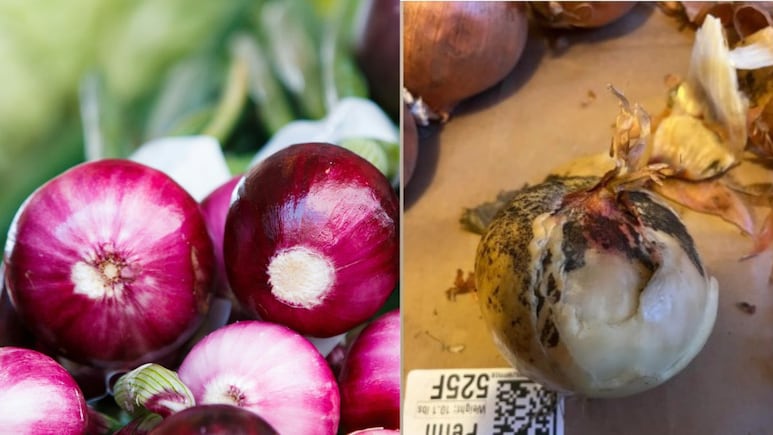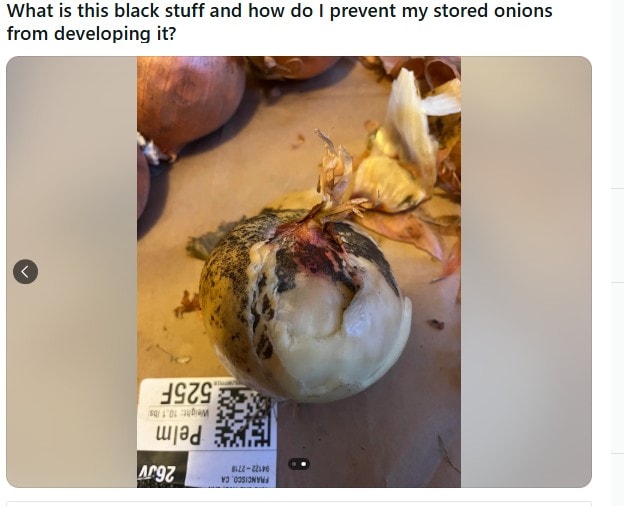
If you have found yourself standing in the kitchen, staring at a pile of onions with a suspicious layer of black dust, you are not alone.
This 'black powder' has become a common sight across markets and online deliveries, raising concerns among consumers about whether these onions are safe to eat. Experts say it's not just a cosmetic problem-it could be a sign of something more worrying.
"Have you noticed that onions these days are covered with some sort of black soot, and no matter where do you buy them from, they are of the same quality. That's not mud, it's Aspergillus niger, a fungus that thrives in warm humid spaces," said Dr Nandita Iyer, medical doctor and health & lifestyle coach, in one of her Instagram posts.
What The Black Powder Really Is
Dr Yashawant Kumar, Founder and CEO of Benefic Nutrition, explained, "The black powder that you see on onions is spores of a fungal disease commonly from Aspergillus niger (Black Mold). The black powder is a sign of spoilage and fungal contamination. Aspergillus niger produces a mycotoxin named Ochratoxin A which could be harmful to the kidneys with long-term exposure."

A user's post on Reddit. Photo: Reddit
According to him, this fungal problem is not new, but it has been showing up more frequently due to storage conditions. "The increase in black powder on onions is a combination of factors in the supply chain storage facility, high humidity (fungi multiply in moist environments), poor air circulation and warm temperatures."
Why It Has Increased Now
Dr Iyer pointed out similar reasons in her post, "Why are we seeing so many on onions these days? It's because, of course the humid weather, and then there is poor ventilation, storage, longer shelf times in the warehouse and the musty dark stores of the quick commerce brands."
Essentially, modern retail systems that focus on bulk stocking and longer storage are making onions more vulnerable to fungal growth. Combine that with India's high humidity and inconsistent ventilation in shops, and you get the perfect recipe for black mould spreading across kitchen staples.
Is It Safe To Eat
The short answer from experts is : be cautious.
Dr Kumar said, "First thing is to remove the affected ones from the rest of onions to stop it from spreading the spores, if possible throw it out if it's a small. Inspect the storage area of the onions and wipe the area with vinegar solution to prevent further contamination. If you find black powder after cutting the onions, don't use it just dispose of it in a bin."
Dietitian Pavithra N Raj from Manipal Hospital, Yeshwantpur, Bengaluru, also emphasised the risk.
"The black powder is a soil-borne fungus that can produce toxins and is generally not considered safe to eat especially for those with weakened immunity or allergies, which will produce mycotoxins harmful to liver health," she says.
She further adds that eating onions with black layers introduces mycotoxins into your system. These toxic compounds are produced by certain fungi that grow in improperly stored or damaged onions. Long-term exposure to these toxins may lead to liver stress and dysfunction and respiratory issues.
What You Can Do At Home
While discarding badly infected onions is the safest approach, experts also recommend some preventive steps to reduce risks at home.
Pavithra suggested, "To avoid it, store onions in a cool, dry, well-ventilated area away from potatoes. It is likely due to high humidity and poor ventilation in storage, which creates a favourable environment for the fungus to grow. Wash the onions after peeling and then they can be used for cooking. Slightly salt rubbing and washing is still better for a safe use for people with weakened immune system."
Dr Iyer added a few more tips.
- Always wash your hand and your chopping board after cutting these onions, because these spores can hitchhike to other foods and trigger allergies.
- Store onions in mesh baskets for better ventilation, never in plastic bags or closed baskets.
- Buy fresh and not in bulk, and buy it from a store, you'll have better chances of getting good quality of onions from stores.
- Avoid buying online from delivery apps when possible.
The Bottom Line
Onions remain a staple in Indian kitchens, valued for their flavour and their health benefits.
But when the black powder shows up, it's a red flag. The consensus among experts is simple: outer skin contamination can sometimes be managed with proper cleaning, but if the fungus has spread deeper into the layers, or has slimy smell or funky smell it's better to discard the onion entirely.
Track Latest News Live on NDTV.com and get news updates from India and around the world

